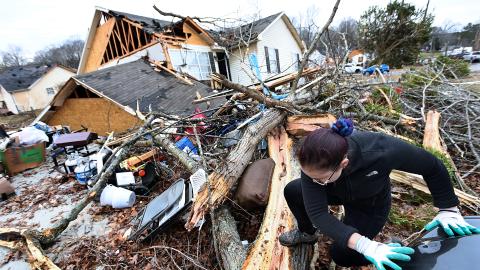Many Americans Still Struggling with High Cost of Living as Fed Rolls Out 11th Rate Hike
CAPITOL HILL — The Federal Reserve Wednesday escalated the inflation fight once more in its most aggressive series of rate hikes in 40 years. The Fed imposed another quarter-point rate hike on Wednesday in an effort to slash consumer demand and get companies to hire fewer people.
It's the eleventh rate hike over the past 15 months. Economists say it's meant to slash shopping and spending in order to force the sky-high cost of living to go down. There are some visible ways to see if it's working.
Vacant shops — a sight shoppers can get used to this summer. In downtown San Francisco, a bleak scene and a sign of the times that hiring is going down — which economists say is another goal of the Federal Reserve.
Federal Reserve Chairman Jerome Powell hasn't ruled out additional rate hikes in the fall and noted the potential impact on working families.
"My colleagues and I are acutely aware that high inflation imposes significant hardship as it erodes purchasing power, especially for those least able to meet the high cost of essentials, like food, housing, and transportation," Powell said.
Economists say the idea is that higher rates make businesses tighten their belts, leading to less hiring and greater unemployment.
"Unemployment benefits are going up because the Fed believes that it needs to get unemployment to about 5% from where it is now at 3 percent," Keel Point chief economic advisor Steven Skancke said. "Which means about 2 1/2 million people are going to become unemployed. That's not good for workers."
Experts said to also expect lower income and higher borrowing costs.
A small bright spot shows that savers are earning more on their cash – but there's also a cost to the nation.
The borrowing cost for the U.S. Treasury may also rise.
New numbers from the government's "FiscalData" website show this week the country's total public debt hit $32.597 trillion.
Concerned, a bipartisan group of U.S. lawmakers is set to form a political alliance called the Bipartisan Fiscal Forum to focus on U.S. debt.
Economists said many families are focused on their own checkbooks rather than the nation's economic growth.
"It's sort of hard to find the average family," Skancke said. "Some people have really benefited from the stock market being up as it is, some people are struggling to make their mortgage payments. But if you look generally, the percentage of people looking for jobs that don't have it is at a 50-year low."
The cooldown of inflation coupled with resilient economic performance has given rise to optimism among some economists that the U.S. could avoid a recession. Most forecasters surveyed this week by the National Association for Business Economics said the probability of the U.S. entering a recession in the next 12 months is 50% or less.



